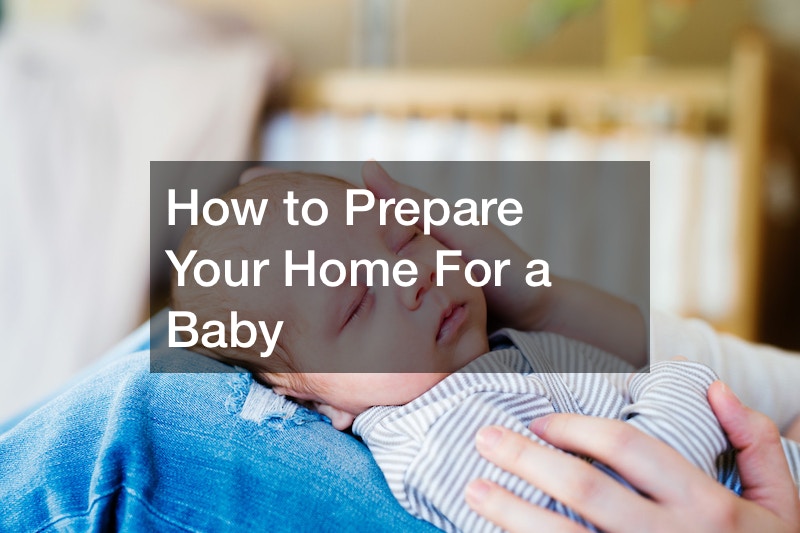
Whether you’re three months or nine months pregnant, you likely have a lot running through your mind. Not only do you have to worry about carrying the baby to term, keeping up with your gynecologist appointments, and buying baby clothes, but you also need to prepare your home for the baby’s impending arrival. Don’t worry, though; we’ve got you covered. Here’s how to prepare your home for a baby.
1. Plan Your Move Well in Advance

If moving before your bundle of joy arrives is a priority, it’s best to plan things well in advance. Anyone who’s ever purchased a home knows that the process is a long one and can be unpredictable and stressful. This is the last thing you need when you’re expecting a child or are caring for a spouse who is expecting. Moving during the early stages of your pregnancy is a lot simpler than hauling boxes and frantically cleaning cabinets when heavily pregnant. Keep the cleaning antics for your nesting phase when you want to do it. However, if you’re forced to relocate during the later months of your pregnancy, there are steps you can take to make a move less stressful.
To prevent the relocation from negatively affecting you or the baby, carefully plan your move. Get as much help as possible, and take it easy during the move. If you’re relocating while pregnant, renting storage space can be helpful as it allows you to store baby equipment until you need it. If you’re downsizing and just don’t have the space for it in your present home, this can be useful. If you’re living with family while waiting to sell your old home and move into your new one, you can use a storage facility to avoid taking up room in your parents’ already-congested garage. Storage facilities must also be equipped with warehouse doors to guarantee the safety of your belongings. With all these factors to consider, planning a move well in advance is a great tip for how to prepare your home for a baby.
2. Stock Up On Supplies
Stocking up on supplies is perhaps one of the best tips for how to prepare your home for a baby. Once the baby is born, there won’t be much time left for activities like cooking, cleaning, or even shopping. So stock up on supplies in advance for the rainy days. Here are some essentials to keep on hand:
-
- Food Supply: After the baby is born, you won’t have much time for cooking or grocery shopping. Stock up on groceries, frozen dinners, cereals, and anything else you’ll need for the first few days. Also, consider ordering food. Most of the time, when thinking about food supplies for nursing mothers, most people think of baby food. However, a mother’s feeding is equally as important as that of her infant, particularly when the baby is still suckling. Therefore, get food supplies for both the mother and child.
- Feeding Supplies: When stocking up on baby supplies, some parents forget to buy feeding supplies such as napkins, feeding bottles, and other feeding kits. You need to have the appropriate feeding supplies on hand for your baby. From nursing pillows, breast pumps, and pads, feeding bottles, and pacifiers, to milk storage containers, make sure you have everything you need. These supplies will make feeding your baby simpler and more practical. Purchase at least two different varieties of feeding bottles and nipples if you can, as you never know which your baby will prefer.
- Washing and Cleaning Kits: There are a lot of stains involved in taking care of a baby. Having enough cleaning supplies and equipment on hand means you’re ready for unforeseen emergencies.
- Toys and Other Baby Kits
: You’ll certainly need toys to keep your baby busy from time to time. You can use that little window of time to do chores around the house or to take a quick nap. Keep a couple of squeeze toys, soft dolls, and rattles. It’s also a good idea to stock up on babywear, diapers, and other necessities.
Stocking up on these supplies reduces the number of trips you have to make, especially in the early days of your baby’s life.
3. Install A Monitoring System
Installing a monitoring system is a great tip for how to prepare your home for a baby. Babies wander a lot, and occasionally, the wandering comes with some form of damage. When babies first begin to crawl, this is often the case. Setting up a monitoring system to notify you when your child approaches danger zones or leaves the crib is a smart move. You won’t always be able to keep an eye on your child, so you’ll need all the assistance you can get. Even if CCTV cameras or video monitors aren’t within your budget, a basic alarm will do. You can get a cheap monitoring device that only requires an antenna install to notify you when your baby starts crying, especially if it hasn’t started to crawl yet.
4. Baby-Proof Your Residence

Baby proofing your residence is one of the most important tips for how to prepare your home for a baby. You need to ensure your baby is safe in every corner of your home. Approach this task meticulously. To get a better view of all the edges and objects that pose risks to your baby, go down on all fours. Baby Proofing is especially important when your baby starts crawling. Here are some key steps to take when babyproofing your home:
- Cover electrical outlets with child-safe covers
- Use safety gates to keep the infant away from certain areas of the home, such as the stairs
- Secure your furniture to the wall, particularly in the nursery
- Equip cabinets with safety latches and locks
- Install a plush carpet or rug for a soft landing
- Hide stove knobs
- Remove anything made of glass from the baby’s area or keep it far away
- Soften or cover sharp edges on tables, chairs, etc.
- Keep toys within reach
- Take down heavy objects from walls, especially in locations where your child plays
Although preparing your house for your baby can be quite time-consuming, the benefits are worthwhile. When everything is in order, and your home has been baby-proofed, you can relax and spend quality time as you wait for your baby.
5. Batch Cook
To help you get through the hectic newborn days, batch prepare and freeze some meals. This is one of the best tips on how to prepare your home for a baby. Plan a few simple recipes you can prepare in large quantities and then freeze; most will stay fresh for a few months. By doing this, you can quickly grab a tasty and nourishing meal that will keep you going during the challenging early phase of motherhood without having to spend money on takeout or deal with the stress of grocery shopping and meal preparation. Pasta sauces, chili, curries, stews, and soups are some of the simple dishes you can prepare in bulk and freeze in separate serving sizes.
Stock up on microwaveable packets of grains and rice, and you’ll have enough tasty and nutritious meals to last you for weeks. You can also request family and friends to send meals and other useful supplies rather than gifts, as it’s likely that you’ll be drowned in baby clothes but short on time for grocery shopping.
6. Set Up a Downstairs Basket
A newborn can go through 12 nappies in a day. If you live in a bungalow or a one-story apartment, this step isn’t really necessary. However, if you live in a home with more than one storey, your days will entail several trips up and down the stairs when you’re feeling the frailest, exhausted, and sore after giving birth. It’s also safer for everyone if you can limit the number of trips you make in a day, since a 2012 study in the USA found that 25% of newborn accidents and personal injury happened when they were being carried up or down the stairs. For this reason, having a downstairs basket is a great tip for how to prepare your home for a baby, as it will significantly reduce the number of trips you make up and down the stairs.
Use it to store all of the things you’ll need throughout the day to keep yourself and your baby clean, dry, and entertained. Your basket should have diapers, muslin clothes, wipes, cotton wool, extra baby clothing, and a spare top for you, as you’ll likely be covered in milk at some point in the day. Make sure you have a changing mat downstairs as well. It should be small enough to fit neatly behind or under the couch or down the side of a cabinet for easy access. Remember to keep it well-stocked and handy for emergencies.
7. Rethink Lighting

Rethinking lighting choices is another great tip about how to prepare your home for a baby. Your lighting choices for your home were likely made before you became a parent, so when you find yourself scrambling to put a baby to sleep (or keep them asleep!), your demands may drastically shift. Consider soft ambient lamps, dimmer switches, and night lights for your baby’s room. This way, you can avoid harsh lighting during those midnight feeds, which would otherwise wake everyone up and make it hard for your baby to fall asleep again.
The best way to ensure babies (and parents) stay asleep during night feeds may seem to be total darkness, but you need some light to help you get out of bed without bumping into something. During longer feeds, you’ll need some form of lighting so you can read the newest bestseller to stay alert and fight boredom. With some research and planning, you can design and install a brand-new lighting system that will ensure you and your kid get through the night with as much sleep as possible.
8. Thoroughly Clean Your Home
Cleaning your home as you think about how to prepare your home for a baby may seem straightforward, but it’s often overlooked by most parents (especially new ones). They only realize it when they come home from the hospital to a worn-out house that needs a thorough cleaning. Giving yourself and your spouse a list of cleaning tasks to perform in the days preceding your due date can help you better prepare your home before your baby arrives.
If your friends and relatives are eager to lend a hand and are looking for ways to help you, invite them over to help with cleaning. If you can afford it, consider hiring a professional cleaning company to thoroughly clean your home. Nothing beats the feeling of coming home with your new baby to a sparkling clean home that smells great.
9. Tune Up Your Home’s Heating
Your home should always be warm with a baby around. Note that babies can’t readily adjust their internal temperature as adults can. If your baby’s room is too cold, they’ll become fussy and have trouble falling asleep. If it’s too hot, it may cause heat rash and possibly increase your child’s risk of SIDS. Maintaining the ‘perfect’ temperature is crucial. Professionals advise maintaining your baby’s room around 68-72°F (20-22.2°C) all year long. Purchase an indoor thermometer to monitor the temperature in your child’s room.
If your furnace has been having issues, contact a furnace repair company as soon as possible to have it fixed. This gives you complete control over the temperature in your home, especially in your baby’s room.
10. Have Some Renovations Done

Life with a baby isn’t anything close to the life you had when you were just a couple or living alone. For example, some babies are generally less fussy when they’re outdoors. In this case, replacing a patio or deck would be a good idea. Remember to factor in some shade as well, since a baby’s eyes are sensitive to sunlight. Regardless of the renovations you do, always work with a reputable home builder or professional concrete contractors for the best results.
Before you can start worrying about tuition tax credits or getting a car insurance quote for your teen, you first need to figure out how to prepare your home for a baby. This can be an overwhelming time, but it doesn’t have to be. Use this read as your guide for how to prepare your home for a baby, and don’t hesitate to ask for help when you need it.




